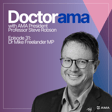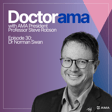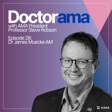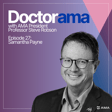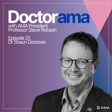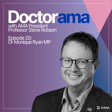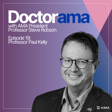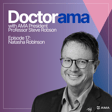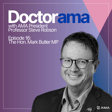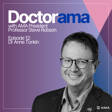Become a Creator today!Start creating today - Share your story with the world!
Start for free
00:00:00
00:00:01

Episode 1 - Injectable Weight Loss Drugs
Recommended
Transcript
Introduction to Weight Loss Injectables
00:00:00
Speaker
Hi, I'm Magdalena Simones. I'm a GP and I'm very excited to be talking to you today about weight loss injectables with my colleague and friend, Professor Steve Robson. You're listening to the Health Chat Podcast. Hi, Steve.
00:00:25
Speaker
Hi Magda, good morning. This is a subject close to my heart and I'm absolutely intrigued that a medicine would be so popular on social media that it gets bought out and people who actually need it for their disease can't buy it. So I'm intrigued to find out all about these drugs. Magda, tell me about these injectables.
00:00:45
Speaker
They're called GLP-1 injectables or drugs. They've got a lot of trade names out there and some have been designed specifically for diabetes. That's late onset for people who have
00:01:01
Speaker
elevated sugar levels and have weight loss issues when their medication ceases to work that well to control their blood sugar levels.
GLP-1 Injectables: Usage and Concerns
00:01:10
Speaker
But what's happened is that because they give you a sense of fullness at the same time as helping you control your sugars, it has become quite a popular item as a fast, safe weight loss product that's been really circulated widely on social media.
00:01:30
Speaker
They're rather expensive, however, and they're not really designed for people specifically to lose just weight. They're really for sugar levels, blood sugar levels that are difficult to control. And because there's been a really big push to look a particular way and to lose weight quickly,
00:01:53
Speaker
They've also become really high in demand and patients are coming in saying, oh look, after Christmas I've gained a few kilos and I've heard about these amazing drugs and I want to know more about them. Can you prescribe them for me? So this is a situation a bit like, and forgive me for bringing this up, Viagra or the alopecia
00:02:17
Speaker
treatments where they were designed for one thing, blood pressure control, but they've found to have a side effect that everybody covets. Is that what's happened here?
Safety and Side Effects for Non-Diabetics
00:02:25
Speaker
That is what's happened. Although what we know about drugs like Viagra and what we know about alopecia drugs is that they have certain applications elsewhere. However, with blood sugar lowering drugs,
00:02:43
Speaker
What we don't know is what their effects will be in the long term for people who don't really have elevated blood sugar levels. For instance, if you're using an injectable just to lose weight, and then you stop the injectable after 6 to 12 months,
00:03:01
Speaker
then how is your pancreas going to produce the insulin needs to manage your metabolism the way it needs to? So we're not sure about the long-term safety of these in non-diabetics. For diabetics, they're designed to be on them for longer term.
00:03:21
Speaker
control of their blood sugar levels. But for non-diabetics, people who want to lose a 6 to 10 or 12 kilos, we're not sure what's going to happen after 6 or 12 months of using them. And we do know that some people sort of plateau on them and they stop losing weight. They get very frustrated.
00:03:39
Speaker
What we are seeing more of is that people, because there's been such an influx of people purchasing these, and some from online sources too, that we're seeing a lot more of the complications.
00:03:58
Speaker
And these are quite terrifying because they can make the intestine really slow down and they can cause intestinal obstruction. They can also in some cases inflame the pancreas, so we're seeing more cases of pancreatitis than we've seen before.
00:04:18
Speaker
That's because people are trying to speed the weight loss and speed the uptake of the dosage. As I said at the outset, they're not really designed for everybody.
00:04:33
Speaker
I might say, look, I want to lose some weight, see a GP like yourself. And you would presumably talk me through an exercise program, healthy eating, expecting it to take time. And I think the evidence is around that. But are you seeing patients come in now and say, look, forget about all the other stuff. I just want these injections. I want to lose weight. I've heard it's really effective. Is this something that you're seeing in your clinical practice?
00:05:00
Speaker
Yeah, I am seeing quite a bit of that, Steve. I'm seeing people saying, oh, look, you know, I've tried every diet under the sun and I'm pretty fed up and I want something that's fast and is going to give me the outcome I want. And, you know, this comes at a particular price. So they're not cheap. To buy them off-label, which means that you don't have a medical condition such as diabetes. For diabetics, they cost the standard script.
00:05:28
Speaker
But they are rather expensive drugs. To buy them off-label, they cost anywhere between $180 to $400 per month to be on. So when you consider that about a six-month period, that's a heck of a lot of money. That's a big investment for something that might give you five or six kilos at best, the weight loss. Let's say it's just after the Christmas New Year period, I've gained some weight.
00:05:55
Speaker
I'm busy. I come in to see you and say, look, I just want a prescription for these. I've seen it all over social media. The Academy Awards, people are talking about it. How do you handle that consultation with me? What do you tell me?
00:06:09
Speaker
Well, I think the first thing is it's really important to understand and accept that people get pretty frustrated with not being able to achieve their outcome. We've all been there. We've all got those extra kilos that we want to shake. We have all been there, Magda. We're hearing more and more about the long-term consequences of weight gain and carrying too much visceral fat, the fat that you have around your tummy and the
00:06:36
Speaker
fat that you have around your organs and how that's bad for your health. It's always a good thing when people come in asking to help with weight loss if they've got extra kilos that they should lose. I'm rather encouraging of that to begin with. Then we explore what they've tried. Certainly, what have you tried and what are you doing.
00:06:58
Speaker
And there's nothing better really than taking a food diary and taking basic measurements to start with. So if you don't measure what you're eating, because really you gain weight for a variety of reasons. Firstly, I've got to exclude all the medical reasons for weight gain, whether or not there are hormonal reasons like thyroid disease, polycystic ovarian syndrome, perimenopause, menopause, some sort of
00:07:23
Speaker
adrenal tumors, you know, things that can, and even medications, some medications, some forms of anti-depressant can even anti-epileptics can
Holistic Weight Management Approaches
00:07:31
Speaker
cause weight gain. So there are a variety of other medical reasons for the weight gain. But then you really do need to measure the basics, which is what goes in versus what goes out. And the what goes out is your exercise level and your output. And what goes in is the calories that you have per day. And that's in the form of, you know, also portion size and all those little hidden things like, you know, I might have
00:07:53
Speaker
a few chips after dinner. I feel a bit peckish and I have just one of the linked chocolates with my cup of tea. You know me well. You know me well, Amanda. Small portions of bad stuff through the day also count.
00:08:10
Speaker
And so you add that all up. And I think that this is a really important exercise to undertake with people, to help them understand that we do have some control over what choices we make. And I think it's really about helping people make better choices.
00:08:30
Speaker
And then you say, OK, what's your weakness? Like, you know, mine is, let's say, you know, hazmat chocolate or something, which it is. And you say, OK, so what's your weakness? And when do you most crave that? And so you come up with a series of options for that particular point of the day or time or that emotion that leads to that particular behavior. So you help make it healthier choices. So you remove a lot of those temptations from the day.
00:08:59
Speaker
What's the old saying? I can resist anything except temptation. So it's a big thing. But I get a lot of people must come to you and say, look, Dr. Simonis, I get all of that. I've tried everything. I just want this medication. How do you handle that sort of pressure to say, look, I have tried everything, blah, blah, blah, blah, blah. Can you just help me? Because it seems to be working for everyone else. Is this a thing that you get occasionally?
00:09:27
Speaker
Yeah,
BMI, Society, and Sedentary Lifestyles
00:09:28
Speaker
we do. But I think that there are certain cutoff marks and cutoff limits, and there's a BMI, a body mass index, which we do need to measure. And most people come in already very well prepared with this. They'll say, oh, I'm just on 30 BMI, which is your weight in kilos divided by your, or your height in meters divided by, your weight in kilos divided by your
00:09:53
Speaker
height in meters squared. A BMI of 30 and above is considered around obese. A BMI, a body mass index of around 25 to 0.1 to 29.9, which is where most of us sit, is overweight. That's 6 tenths of the population, around 60% of us are in that group.
00:10:17
Speaker
And a BMI of say you know nineteen and a half to twenty five is the healthy range. It's really amazing how I guess the lens we look at things with this change if I look at photos from twenty or thirty years ago there are very few overweight or obese.
00:10:34
Speaker
people and we've kind of adjusted as a society to this almost sort of being normalised. You look at photos now, people are a lot bigger than they were 20 or 30 years ago. Is that your sort of sense of things? Yeah, I think that we're talking about the global problem of weight gain and obesity. It's coincided with a lot of things. I think most of us will see also that we're spending a lot more time in computers, in front of computers and we're not moving around as much.
00:11:03
Speaker
I think certainly with COVID, we've been sitting and working at home, working from home. We've learnt now also to work from home a lot more. Then there are games. People are doing gaming and sitting in front of a computer gaming, not just watching TV.
00:11:18
Speaker
and Netflix series, et cetera. They're interacting with other people on technology, which means they're not going to go out for the walk or play tennis. And the thing is that we're seeing that also in children. So we're seeing weight gain from a very early age now and younger people and younger adults with weight issues. And that's not just in Australia. That's a global phenomenon.
00:11:49
Speaker
We're calling the sedentary lifestyle the new cancer. It's just so risky for all of us. We've got to get active. We've got to move more.
00:11:57
Speaker
Yeah, look, I agree with that. The other thing I've noticed is it's so much easier to have food delivered to you these days. You know, this fast food is ubiquitous. It's easy to have it delivered. And I suspect a lot of families just don't make a healthy meal from fresh ingredients as much as they used to. Is that your sense of things?
00:12:21
Speaker
Yeah, that's a great point. In fact, I think you've hit the nail on the head there, Steve, because with a lot of the apartments that are being built now for the single professional people,
00:12:33
Speaker
and single couples who are electing maybe not to have kids or to pursue a career. A lot of the apartment blocks and apartments are being designed without sophisticated kitchens. They've got a microwave and a hot plate, and that's it. They know that your younger people, the next generation, isn't cooking as much. They're either eating out or ordering in.
00:13:00
Speaker
Yeah, you're right. Not everybody knows what goes into how that meal is produced and what the fat level is and what the carbohydrate, the fast or the simple carbohydrates like noodles and rice and
00:13:19
Speaker
and all the sources that go with it. And then the fat content, like, who doesn't like a bucket of chips? But the thing is that that is...
Risks and Regulation of Injectables
00:13:33
Speaker
Certainly, when you think about having something like that as an evening meal and then not moving afterwards, well, whatever you have as an evening meal is really going to be converted into
00:13:46
Speaker
fat because it doesn't get burnt. Now look, I've taken you totally off the track here about the injectable medications and that's my fault. If you're talking to your patients about these medications, what do you want them to know? What are the key messages that you like your patients to get about these new injectable weight loss drugs?
00:14:13
Speaker
One, that they're not as safe as they think and that they might have some severe side effects, that they need to come in for a monthly check-in. I need to also be sure that they've got healthy kidney function and healthy liver function. I like to know more, obviously we do the baseline measures in terms of their, you know, qualify them in.
00:14:37
Speaker
for the use of the drug and then also teach them how to use the injectable so that they don't make mistakes with their own drawing up of how you actually measure your dose and to drink lots of water with these because you really do need to make sure that you keep the intestines lubricated to help with to prevent constipation.
00:15:01
Speaker
Then there's also the conversation that has to be had around the diet, changing and modifying the diet. It's not just about eating less, it's about eating and making healthier foods and making healthier choices.
00:15:16
Speaker
And keeping a food diary, I think, is really important. And an exercise and movement diary is really important with that. So, I talk about this as a holistic approach. I've also had quite a few patients who've come in with injections ready-made from a pharmacist that they've purchased through some online source.
00:15:39
Speaker
or through another source because they're unavailable. And there's been such a huge demand for these that there are stocks that are in very, very low supply, even for the diabetics.
00:15:53
Speaker
And so some of the companies are manufacturing, and not the companies that have actually invested in all the research, but other companies are manufacturing these or equivalent products and selling them through other online services. And they're called the compounded versions of the injectables. Right.
00:16:16
Speaker
The thing with injectables, you might be familiar with all of this. You would be actually, Steve, with menopausal hormone replacement therapy. Not all compounding products are safe, nor are they consistently made. They're made in different laboratories that don't have the same standards and quality standards.
00:16:39
Speaker
And that even the raw products that they access, that they get to make the drug with, might come from different sources and from different countries, which don't have the same standards that we have. And they don't get tested by the TGA. So they're big, big issues and concerns for someone like me. Yeah, that's a real issue, isn't it? And it's a real
00:17:04
Speaker
buyer beware situation, but of course you've got so much pressure on social media. You know, these are the way to go and people in particularly with the shortages are very desperate to get them. I think kind of looking at the future, we know that these new drugs for weight loss are making incredible profits for pharmaceutical companies. And when there is a
00:17:32
Speaker
a financial incentive, then we tend to see a lot of very heavy marketing of them. And in the past, like we, when we were sort of a year ago, we would have medications marketed to us as doctors, but these days they're very much marketed to the public, even if it's through social media and things like that. So I think we're going to have a struggle if we're going to kind of control community demand for these. Would you think so?
00:18:00
Speaker
Yeah, I think we need to be talking about lifestyle a lot more. I think also people aren't aware of the fact that they're being marketed to, and that this industry is worth... I think it's estimated to be around US$100 billion by 2030. That's a huge market.
00:18:19
Speaker
Wow. And it's unregulated. Yeah, look, absolutely, absolutely. So, look, we know that globally and in Australia, the Australian Institute of Health and Welfare suggests, as he said early on, that about roughly two-thirds of Australians are either overweight
00:18:38
Speaker
So it's a problem that's not going to go away soon. But I mean, my sense is that if you are in a situation where it's important you lose weight, you see your GP and talk this through. It's not a thing to do alone. You need support and your GP is not your place to start.
00:18:59
Speaker
It is, and I think one of the other really important take-home messages is that in my experience, and this might be a negative slant on it all, is that I've not seen many people who've taken the injectables for weight loss stay at the weight that they wanted to.
00:19:20
Speaker
when they've come to, let's say, the six-month or 12-month mark. Like I said, they plateau. And what we don't know is whether or not the waste-locked drugs in those individuals affect their ability to produce insulin long-term.
00:19:36
Speaker
and whether or not it alters the metabolism long-term. For a diabetic where you need it to manage your diabetes and your blood sugar levels and the government is subsidising your prescriptions for the rest of your disease in your life, that's one thing. But for someone who's investing anywhere up to $400 a month on this long-term, that's a really serious consideration.
00:20:02
Speaker
Yeah, absolutely. Sounds like there's a lot to learn. I'm sure we'll be talking about this moving forward. So we're going to take a short break now and we'll be back with some listener questions.
00:20:40
Speaker
Welcome back to the Health Chat podcast with me, Steve Robson. And me, Magda Simones. Magda, we've got a couple of listener questions I wanted to deal with. And the first one I think you and I podcasted recently with Kaz Cook about menopause. And we've got a question from Michelle in Goulburn. Thank you, Michelle.
00:21:00
Speaker
I am 47, not in menopause yet, but I'm anxious to treat myself well. Is there any evidence I should be starting menopausal hormone treatment before I actually get to menopause?
Menopausal Hormone Therapy and Safety
00:21:14
Speaker
Now, this must be something that you see and encounter. Magda, what are your thoughts? Well, it's a great question because I've had quite a few women coming in saying, oh, I heard all about these symptoms and I'm wondering when I'm going to get them.
00:21:28
Speaker
Now, not everyone does. I think that's really important. Not everyone is debilitated by their symptoms of declining ovarian function. When your ovaries that produce your eggs start to sort of waver and not work as well. And so not every woman gets the symptoms. But we do know that some women do get the hot flushes. They get the irregular periods. They might get the brain fog.
00:21:54
Speaker
you know, dry irritation around the vagina, skin changes and even, you know, mood changes and sleep disturbance. So there are a variety of interesting and, you know, complex symptoms that the hormone change changes can cause. But not all women feel those symptoms as badly. So I'd have a conversation about, you know, what it can be like.
00:22:21
Speaker
But also to be aware that it might just be that you just ride this out without any really
00:22:31
Speaker
intrusion or interruption to your life. If your symptoms get to a point where you're really not functioning very well and you feel like you are living a different life because of your hormone changes then certainly that is a conversation you need to have with your doctor. It's interesting and I think you and I were both around when the Women's Health Initiative study was released about
00:22:55
Speaker
Close to twenty five years ago and they seem to be an atmosphere of concern and worry around hormone replacement for women i think still lingers. To this day do you have many patients who come in and anxious or think it's a it's too risky to treat the symptoms and things.
00:23:16
Speaker
In fact, sometimes, unfortunately, it's the women who have the worst symptoms who feel that way. I find that it's the women who come in saying, I've got all the symptoms in the book, but I don't want to take the hormones because I'm scared of getting cancer of the breasts.
00:23:33
Speaker
And so we have that conversation really around the relative risk and what the risk profile that they have is also depending on their own family history, whether or not they carry any genetic
00:23:52
Speaker
predisposition or tendency to breast cancer and whether or not they've got other factors that might increase their risk. The increased risk is really one of age, smoking, and obesity. They're really probably the bigger risks than even hormone or menopausal replacement therapy.
00:24:13
Speaker
I also make it very clear to them, just to sort of assure them, to give them a bit of confidence to explore this as an option, is that the study that was undertaken all those years ago was really based upon much older women who are mostly over the age of 60, who already had a lot of other diseases,
00:24:37
Speaker
And as we know, as you grow older, your risk of breast cancer increases anyhow, and they were on much higher doses and very different menopausal hormone replacement therapy than we prescribe these days. So this is a really big distinction, and we can't say it often enough to get the message out that they're different
00:25:01
Speaker
drugs that we're using now. Absolutely and in fact there's a whole range of different options for women now and I think you've hit the nail on the head about individualizing a treatment that you recommend or start based on the individual person's needs, their situation, their family and their personal history and things like that.
Men's Health: Prostate Cancer Screenings
00:25:21
Speaker
So again the message very clear if you feel that you've got symptoms go and see your GP.
00:25:26
Speaker
Thanks, Steve. Great plug for GPs, but it's very true. It's just so true. Now look, the other listener question from a Charles based overseas, but I'm only joking there, it's from actually a partner, Amy, who wanted to talk
00:25:51
Speaker
about her partner and a concern about, and I guess there's been a lot of publicity about King Charles having some prostate treatment very recently.
00:26:03
Speaker
about what the best, I guess the best screening options are for men and their prostates. Now this is probably something I don't deal with quite as much as you. So I was going to throw it to you. Is this something that you see and what's your advice about screening for prostate conditions?
00:26:24
Speaker
Well, I'm glad you've raised it, Steve, because I think that men's health is somewhat neglected. And I think that men neglect their health. Prostate cancer is a really common cancer. It's the commonest cancer in males in Australia. I think we see there are about 25,000 diagnoses per year. And that's not different in a lot of countries. So it's a really, really prevalent cancer. But it doesn't cause
00:26:51
Speaker
debt in everybody, and I think that that's a really important thing to get across. But we do need to dedicate a whole other health chat podcast on this, I think, because I've got a lot to say on this. Look, I think that's really good. And I think it's even instructive that it wasn't a man who sent a question. It was actually the partner of a man who sent a question in about prostate. So I think it speaks to the fact that men are, to a certain extent,
00:27:17
Speaker
willfully blind about their own prostates or concerns. So I think, I agree with you, I think with the news about Charles, King Charles and his prostate, that we should actually have a whole episode and talk about this in depth. Well look, thank you very much Magda. I think we've got some options here to talk about prostates and things like that.
00:27:40
Speaker
Thanks again listeners and we will be back to you next week with another Health Chat Podcast from me, Steve Robson. And me, Magda Simones. The Health Chat Podcast is produced by Stephen Owen and is copyright with all rights reserved.
